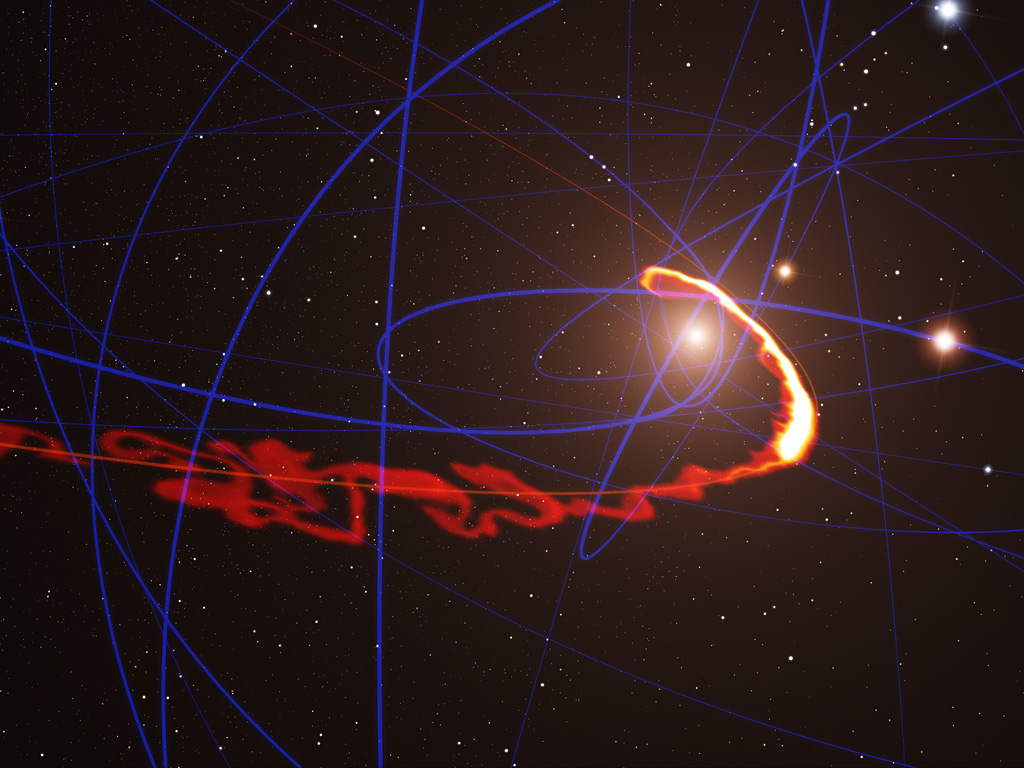
Black holes may be even weirder than scientists had thought, according to a new paper by famed astrophysicist Stephen Hawking.
The paper, which attempts to resolve a paradox between the theories of general relativity and quantum mechanics, was published Jan. 22 in the preprint journal arXiv.org, and has not gone through peer review.
In the article, Hawking contends that the notion that even light cannot escape a black hole's gravitational pull once it passes a certain point — known as the event horizon — may not be true.
Still, not all physicists are convinced: Some say that doing away with the event-horizon concept doesn't resolve the black hole paradox at all.
Fundamental paradox
Einstein's theory of general relativity predicts the existence of black holes — objects so incredibly massive and dense they pull everything nearby into themselves, and past a point known as the event horizon, not even light cannot escape them. [The Strangest Black Holes in the Universe]
But two years ago, theoretical physicist Joseph Polchinski of the Kavli Institute for Theoretical Physics at the University of California, Santa Barbara and colleagues discovered a wrinkle in the theory, dubbed the Firewall Paradox.
Get the world’s most fascinating discoveries delivered straight to your inbox.
The paradox relies on a thought experiment involving an astronaut drifting into a black hole. According to Einstein's theory of general relativity, the astronaut would approach the event horizon and then pass it, blissfully unaware of impending doom. That's because the astronaut would be in free fall, and should therefore feel the laws of physics the same as if he were anywhere else in the universe, Nature News reported.
Once inside the hole, the astronaut would be sheared before being crushed at the black hole's infinitely dense core, known as the singularity.
But quantum mechanics, the reigning physics theory that governs the behavior of very small particles, dictates that black holes are not perfect cosmic vacuum cleaners. In 1974, Hawking theorized that black holes leak particles at their edges — a phenomenon known as Hawking Radiation.
Given that these particles represent a type of "information" that can escape the event horizon, Polchinski and colleagues predicted that a fiery, energetic ring should exist just inside the event horizon — at least if quantum theory holds true.
The firewall would incinerate the astronaut before the dense core compressed the astronaut to a tiny speck. (Either way, the astronaut does not make it out alive.)
The firewall messes up the notion of smooth, unwrinkled space-time at the event horizon.
So, which is it: uneventful event horizon, or fiery ring of hell?
Apparent horizon
To resolve the paradox, Hawking's new paper proposes that there is no fixed boundary of an event horizon.
"The absence of event horizons means that there are no black holes — in the sense of regimes from which light can't escape to infinity," Hawking wrote in the paper. "There are, however, apparent horizons which persist for a period of time."
Rather than being fixed, these apparent horizons shift wildly with the behavior of quantum particles inside the black hole. Energy and matter trying to escape the black hole's death grip would be stuck for a time, before eventually being released.
So although information could escape a black hole's event horizon, the information would be so hopelessly scrambled that it would be very difficult to figure out what it originally came from, Hawking posits.
"It would be worse than trying to reconstruct a book that you burned from its ashes," Don Page, a physicist and expert on black holes at the University of Alberta in Edmonton, Canada, told Nature News.
But not everyone is convinced. For his part, Polchinski doesn't believe that black holes without event horizons are likely to exist in the universe, Nature News reported. Page also thinks Hawking's theory doesn't resolve the fundamental paradox, he told Nature News.
Follow Tia Ghose on Twitter and Google+. Follow LiveScience @livescience, Facebook & Google+. Original article on LiveScience.

Tia is the editor-in-chief (premium) and was formerly managing editor and senior writer for Live Science. Her work has appeared in Scientific American, Wired.com, Science News and other outlets. She holds a master's degree in bioengineering from the University of Washington, a graduate certificate in science writing from UC Santa Cruz and a bachelor's degree in mechanical engineering from the University of Texas at Austin. Tia was part of a team at the Milwaukee Journal Sentinel that published the Empty Cradles series on preterm births, which won multiple awards, including the 2012 Casey Medal for Meritorious Journalism.


